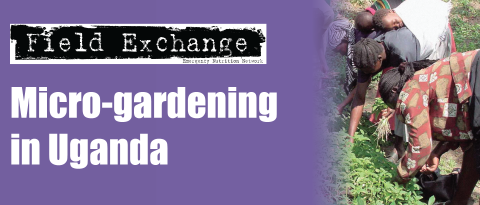Review of Training Opportunities in Nutrition and Food Security
NutritionWorks (NW) has been running courses on nutrition in emergencies in the UK since 1999, working in partnership with the International Health Exchange (IHE), Merlin and the Liverpool School of Tropical Medicine. In order to assist in developing strategic priorities, NW commissioned a review to identify potential gaps in nutrition training, both for emergency and development contexts and partnerships. The review also considered potential networks (northern and southern) with which NW could consider collaboration to advance new nutrition training initiatives, as well as potential funding agencies or institutions interested in future training initiatives.
The review focused primarily on the gaps in nutritional capacity building, limiting any regional focus to Sub-Saharan Africa. Approximately forty individuals were interviewed on their experience in nutrition capacity development, analysis of gaps and recommendations for filling those gaps. A workshop was also held with academic, NGO and partner staff in which a prioritisation of the major gaps in terms of subject and target audience was made. The main findings of the review are described below.
Despite the large number of training courses which currently exist in nutrition1, very few of these enable field workers and managers, particularly government staff and national staff of international or national NGOs, to be responsible for nutrition policy and programming. In part this is due to the geographical location of the majority of the most effective courses - the courses being held outside of the areas most in need - and in part because there is a major capacity deficiency of trainers for regional courses. Furthermore, there is limited coordination between those running the courses, particularly amongst the international agencies. Trainers themselves have limited shared resources in materials (e.g. an interagency CDRom) and many opportunities are missed, e.g. not including experienced people from the field and/or training participants to be trainers within the existing courses. However a determination exists to improve the sharing of materials and reduce potential wastage of resources. It is recommended that an outside facilitator or organisation with a coordination mandate would be best placed to undertake this.
Findings showed that many training course lack a needs and employment assessment, particularly of the organisational needs as well as those of the individual to be trained. This in turn limits the accountability on the part of both the organisation and individuals to take forward and put into practice the elements of the training. Short courses are rarely followed up in any way.
The audiences prioritised by the review for training were local NGO/government staff, managers, nutrition graduates and the trainers themselves. The primary subject gaps were considered to lie in the capacity to undertake nutrition and food security assessments and interpret the results; to develop nutrition policy and undertake planning; to monitor and evaluate nutrition programmes and, amongst senior managers, to understand where nutrition fits into policy and programming.
The need for more decentralised satellite courses was strongly emphasised during the workshop. These should be annual, last for up to three weeks, include field work, be competency based around the participants' work needs and include elements for non-technical managers. The courses should be targeted primarily towards national staff of the regional countries. The courses could either be established within, for example, one East African University or be a roving course between countries (and universities). Trainers must be regionally based with strong facilitation skills. There should be dual objectives of not only sharing knowledge and practice between the trainer and the participants, but also in capacity development.
Areas in capacity development still requiring further research include determining how organisations can work successfully in partnership; how institutions willing to make change can be targeted; how mentoring and support through apprentice schemes can be set up following on from short courses and how academia can be better linked with practice and implementation.
For further information, contact NutritionWorks, P.O. Box 42284, London E7 0YY, UK. Email: info@nutritionworks.org.uk
1Available courses have been listed by the 'Training Initiatives for Capacity Development in Emergency Nutrition' sub-group of the 'Nutrition in Emergencies' working group within the UN Standing Committee for Nutrition and by the British Nutrition Society. A summary of these can be found in the full report submitted to NutritionWorks.
Imported from FEX website


